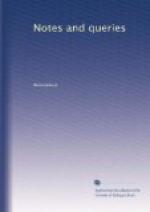“III. The Humiliation and Exaltation of the Son of God considered in the new light, Philipp. ii. 6-12., preached at the primary Visitation of Stephen [Weston] Lord Bishop of Exon, at Great Torrington, 1726.”
“IV. Christ, King
of the Jews both before and after his
Incarnation, Matt. ii. 1,
2., preached on Christmas Day and
First Sunday after Epiphany,
1727.”
“V. The Beginning,
Extent, and Duration of Christ’s
Mediatorial Kingdom, same
text, and preached at the same
season.”
“VI. The natural supremacy of God the Son; same text, &c.”
The three last sermons have a title generally applicable, and repeated before each viz., “The Supreme Dominion of God the Son, both Natural, Oeconomical, and Judaical, proved from Scripture, in three Sermons.” The separate titles bear date 1729; and the publisher was Samuel Birt, at the Bible and Ball, Ave Maria Lane.
This notice may supply the information of which Mr. Denton is in quest, and at all events I should be very glad to learn who the author really was. His sermons are, as is said of those of Stephens, far above the ordinary run. The period at which they were delivered agrees with the dates of those at page 118. The author, in the general preface, says, that Sermon II. was not “suffer’d to see the light before it had pass’d through the hands of Dr. Waterland.” Was not Stephens subsequently Vicar of St. Andrew’s, Plymouth?
Balliolensis.
* * * * *{335}
MINOR QUERIES.
Smelling of the Lamp.—Can you or one of your learned correspondents, tell me the origin or first user of the literary “smelling of the lamp?” I know that it is commonly attributed to Demosthenes? but if it is his, I want chapter and verse for it.
Gourders of Rain.—Will any of your correspondents be kind enough to suggest the etymology of the word “gourders” (= torrents)? It occurs in the following passage of Harding against Jewel (p. 189., Antv. 1565):
“Let the gourders of raine come downe from you and all other heretikes, let the floudes of worldly rages thrust, let the windes of Sathan’s temptations blowe their worst, this house shall not be overthrowen.”
C.H.
St. Catherine’s Hall, Cambridge.
The Temple or a Temple.—I am happy to see that your correspondent, Mr. Thoms, is about to illustrate some of the obscurities of Chaucer. Perhaps he or some of your learned contributors may be able to remove a doubt that has arisen in my mind relative to the poet’s well-known description of the Manciple in his Prologue to the Canterbury Tales.
You are aware that the occupation of the Temple by students of the law in the reign of Edward III. has no other authority than tradition. Dugdale, Herbert, Pearce, and others who have written on the Inns of Court, adduce this passage from Chaucer in support of the assertion; and they all quote the first line thus:




